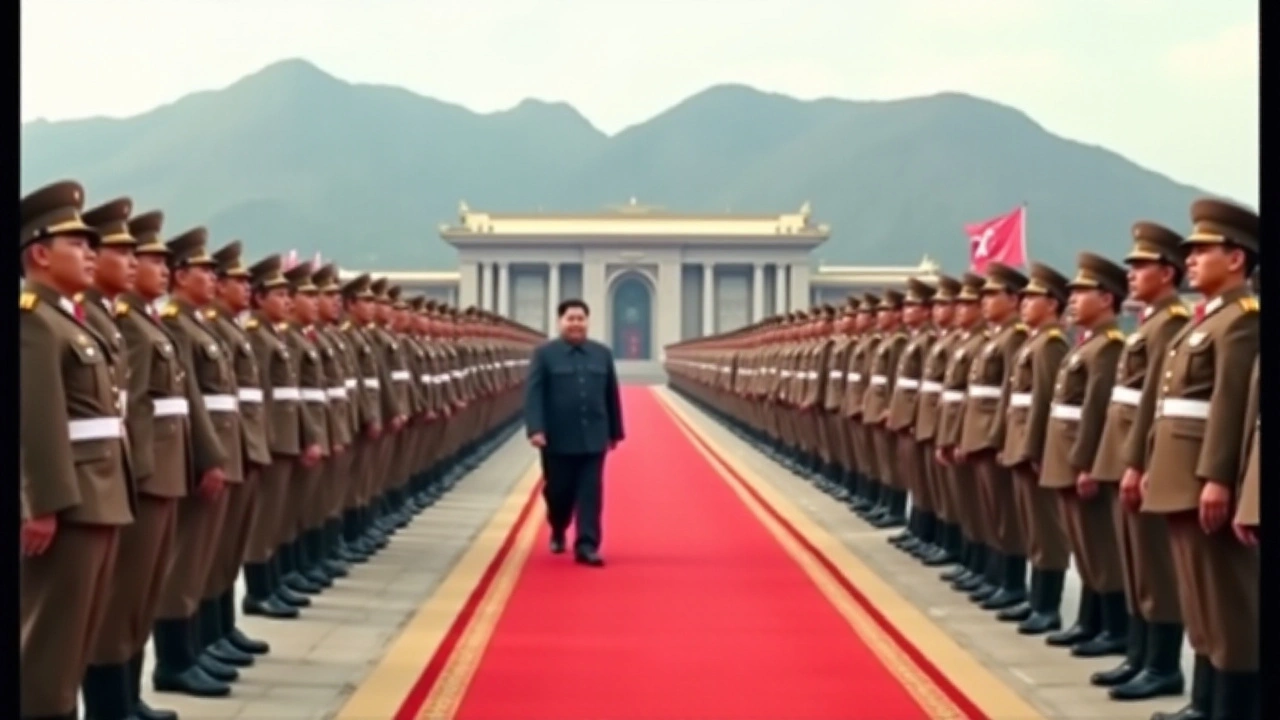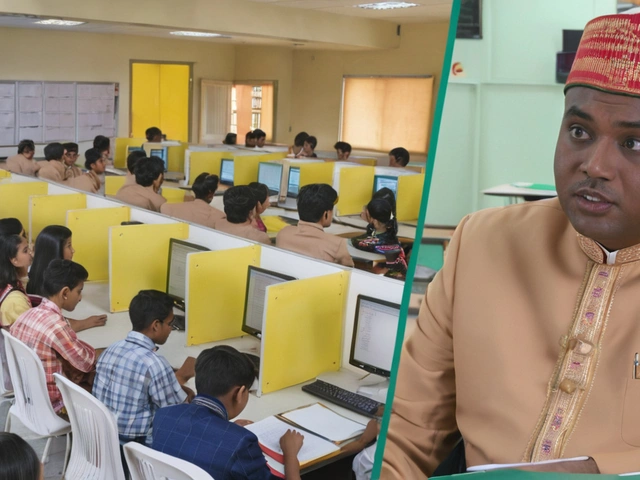Unexpected Shifts at North Korea's Supreme People's Assembly
The recent Supreme People’s Assembly (SPA) session, held on October 7 and 8, 2024, was laden with speculation due to the anticipation of discussions centered on unification and potential constitutional amendments that would redefine North Korea’s territorial claims. However, much to the surprise of international observers, the SPA pivoted focus predominantly towards economic topics and the nation's defense strategies. While the focus on economic issues wasn’t unforeseen, the omission of unification rhetoric was unexpected. Additionally, Kim Jong Un’s conspicuous visit to the University of National Defense, coupled with his speech that leaned heavily on nuclear arms, set the stage for heightened speculations regarding North Korea's political and military trajectory.
Kim Jong Un's Emphasis on Nuclear Capabilities
Kim Jong Un’s visit and subsequent address at the University of National Defense marked a critical point of the SPA session. This rare appearance underscored North Korea's commitment to enhancing its nuclear capabilities. His speech indicated a readiness to take decisive actions should the balance of power on the Korean Peninsula be threatened. This underscores a shift in narrative from cooperation and diplomacy to strengthening defensive and offensive capabilities. The message that potentially enlarges the nuclear arsenal has reverberated across the global political landscape, signaling North Korea's determination to act proactively against perceived aggressions.
Dismantling of Inter-Korean Infrastructure
In the days following the SPA session, North Korea proceeded with the demolition of sections of inter-Korean roads and railways. Such actions have sparked significant concern as these infrastructural links have served as symbols of collaboration and diplomacy between the North and South. The dismantling of these links is interpreted by many as an aggressive maneuver, one that reflects deteriorating relations between the two nations. Beyond its physical implications, this demolition further cements the current climate of hostility, marking a stark deviation from prior attempts at reconciliation.
Alleged South Korean Drone Incursions
The demolition was compounded by North Korea's accusations of South Korean drone intrusions into its airspace, further exacerbating tensions. Initially, North Korea’s response was somewhat muted, leaving space for diplomatic dialogue to de-escalate the situation. However, this diplomatic nuance quickly dissipated as state media took on a militant tone, launching vehement criticism against South Korea along with the United States. This rhetoric featured prominently in media reports that claimed an influx of 1.4 million volunteers for the Korean People’s Army (KPA), indicating an escalatory tone towards military readiness.
Military Posturing and International Relations
The apparent militarization of the political discourse in North Korea, particularly the reference to a million-strong volunteer army, is not an unfamiliar narrative in the nation's history. However, its reemergence at this juncture, in conjunction with heightened anti-South Korean expressions, signals a shift towards a more aggressive military posture. This change complicates an already tense geopolitical climate in the region, compelling South Korea and its allies, including the United States, to reassess their strategic approach.
U.S. and International Reactions
The international community, especially the United States, continues to monitor these developments with cautious interest. North Korea's latest assertions and military preparedness rhetoric challenge the diplomatic efforts to maintain peace and stability in the region. As relations brim with threats and potential confrontations, diplomatic channels remain crucial yet challenging to navigate. The emphasis on military deterrence and security measures becomes both a shield and a point of contention among neighboring states.
A Potential Shift in Inter-Korean Relations
As North Korea's actions take on a combative tone, there is a pressing question about the future of inter-Korean relations. The unexpected turn from dialogues of reconciliation to strategies of division and demonstration may entail a protracted period of strained relations. The dismantling of inter-Korean infrastructure serves as both a literal and symbolic severance of collaborative ties, which may take substantial diplomatic effort to mend.
The Path Forward
It remains to be seen whether North Korea's current military-centric stance is a temporary strategy or a long-term policy shift. The volatility of the region, underscored by North Korea's assertive declarations and strategic maneuvers, reiterates the need for ongoing dialogue and international cooperation. The key challenge for global leaders and nations directly involved will be in balancing defensive readiness with the encouragement of diplomatic engagement, to ensure that de-escalation remains not only a possibility but an achievable reality.







15 Comments
It's easy to feel overwhelmed when headlines scream about missiles and road demolitions but remember that history is a series of choices we all make together we can learn from each other's perspectives and find common ground
North Korea is finally aligning its strategic posture with realistic power projection doctrines; the emphasis on a million-strong volunteer army is a tactical lever that rebalances deterrence calculus across the peninsula and forces regional actors to reconsider their force posture
The SPA's pivot to militaristic rhetoric is nothing more than a cynical smoke screen; it's a blatant attempt to rally domestic support while masking internal economic shortcomings and diplomatic isolation
Even though the news sounds grim we can still hold onto hope that dialogue will reemerge soon; staying calm and focusing on constructive steps can make a real diffrence for the people on both sides of the DMZ
Another flashy threat, same old story.
The current rhetoric emerging from Pyongyang reads like a manifesto written by a restless apprentice of Cold War doctrine.
It glorifies an endless arms buildup while conveniently ignoring the stark realities faced by the North Korean populace.
One cannot help but notice how the emphasis on a volunteer army is employed as a symbolic shield against external criticism.
Yet the very notion of voluntary enlistment in a tightly controlled regime raises philosophical questions about genuine consent.
Moreover, the demolition of inter‑Korean infrastructure serves as a physical manifestation of an ideological retreat.
By dismantling roads and railways, the regime signals a willingness to sever the veins of cooperation that once pulsed across the peninsula.
This act, couched in nationalist rhetoric, is fundamentally at odds with the economic imperatives that any sustainable society must address.
The SPA's pivot toward defense spending also masks a deeper financial strain that has been accumulating for years.
While state media boasts of a million volunteers, the actual numbers remain opaque, shrouded in the same secrecy that characterizes the regime’s internal affairs.
International observers have long warned that such grandiose statements often serve as a smokescreen for internal dissent.
The emphasis on nuclear capability, though presented as a deterrent, inevitably escalates the risk of miscalculation.
Each new missile test or artillery drill adds another layer of tension that could spiral beyond anyone’s control.
It is therefore essential for regional actors to pursue a calibrated response that balances resolve with diplomatic outreach.
Ignoring the underlying economic grievances will only deepen the chasm between rhetoric and reality.
In the grand scheme, true stability will arise not from the size of the volunteer army but from genuine avenues of dialogue.
Until that dialogue is reinstated, the cycle of provocation and posturing will continue unabated.
One must marvel at the audacity of presenting demolition of vital infrastructure as a sovereign right; it's a theatrical display of belligerence that betrays a profound misunderstanding of interdependence and the very fabric of regional stability
Alas, the curtain rises upon a stage drenched in shadows, where the echo of marching boots drowns the faint whisper of peace; let us not be mere spectators to this tragic farce, but rather the architects of a narrative that refuses to succumb to the darkness
Wow, what a complex situation we’re witnessing, isn’t it?, the way the SPA shifted gears toward defense really does raise questions about the underlying economic pressures, and yet, it also opens a window for potential diplomatic engagement, don’t you think?, perhaps a renewed dialogue could emerge if both sides choose to listen
The world is watching. Choices matter. Cooperation can still happen.
Seeing the demolition of cross‑border rails feels like watching a bridge burn in slow motion, it’s a stark reminder that symbols matter, yet I still believe cultural ties can survive beyond concrete and steel, let’s stay hopeful and keep the conversation alive
It’s wild how quickly the rhetoric escalated 😅, but maybe this turbulence will ignite a fresh push for back‑channel talks, and who knows, a brighter outcome could be on the horizon!
While the recent developments are concerning, it is important to maintain a measured perspective and encourage continued diplomatic efforts to de‑escalate the situation.
For anyone tracking this, keep an eye on the official Korean Central News Agency releases 😊 they often drop hints about future policy shifts before anything else.
Oh great, another grandiose proclamation about a million‑strong volunteer army-because that’s exactly what the world needed, another dose of melodrama to spice up the daily news cycle.